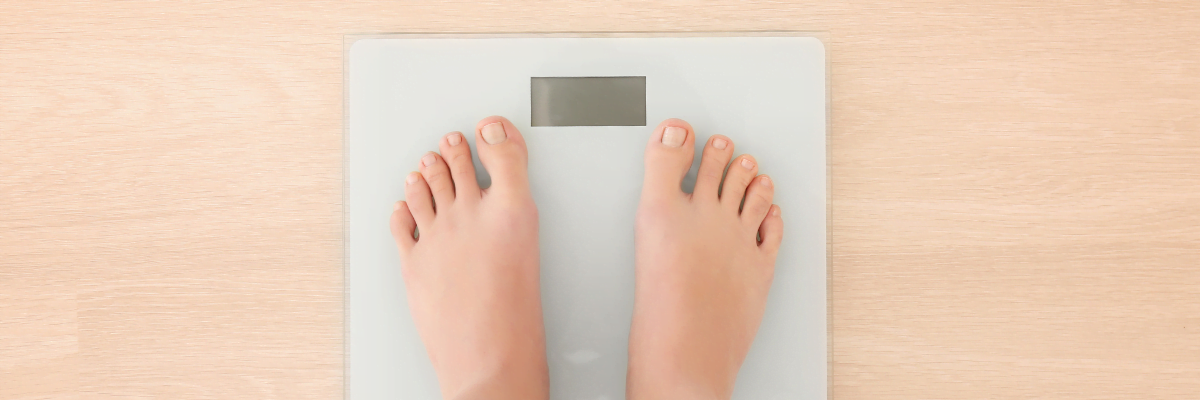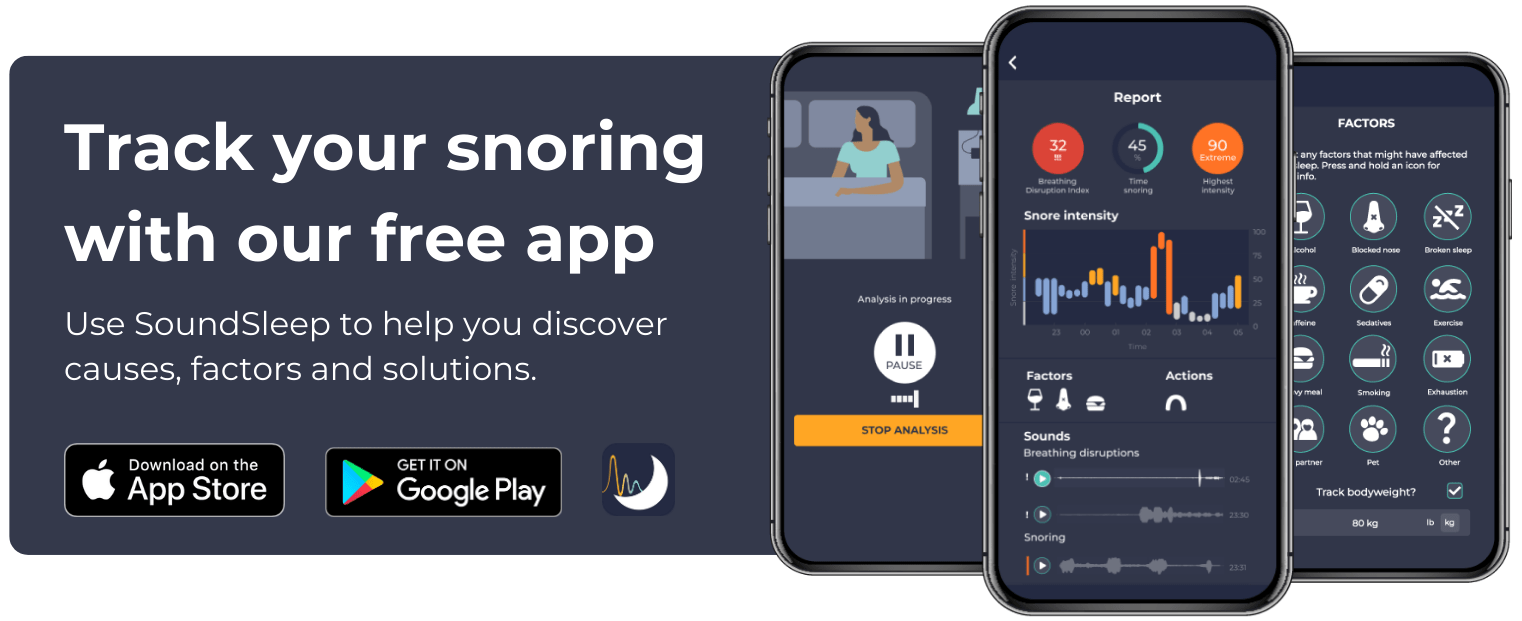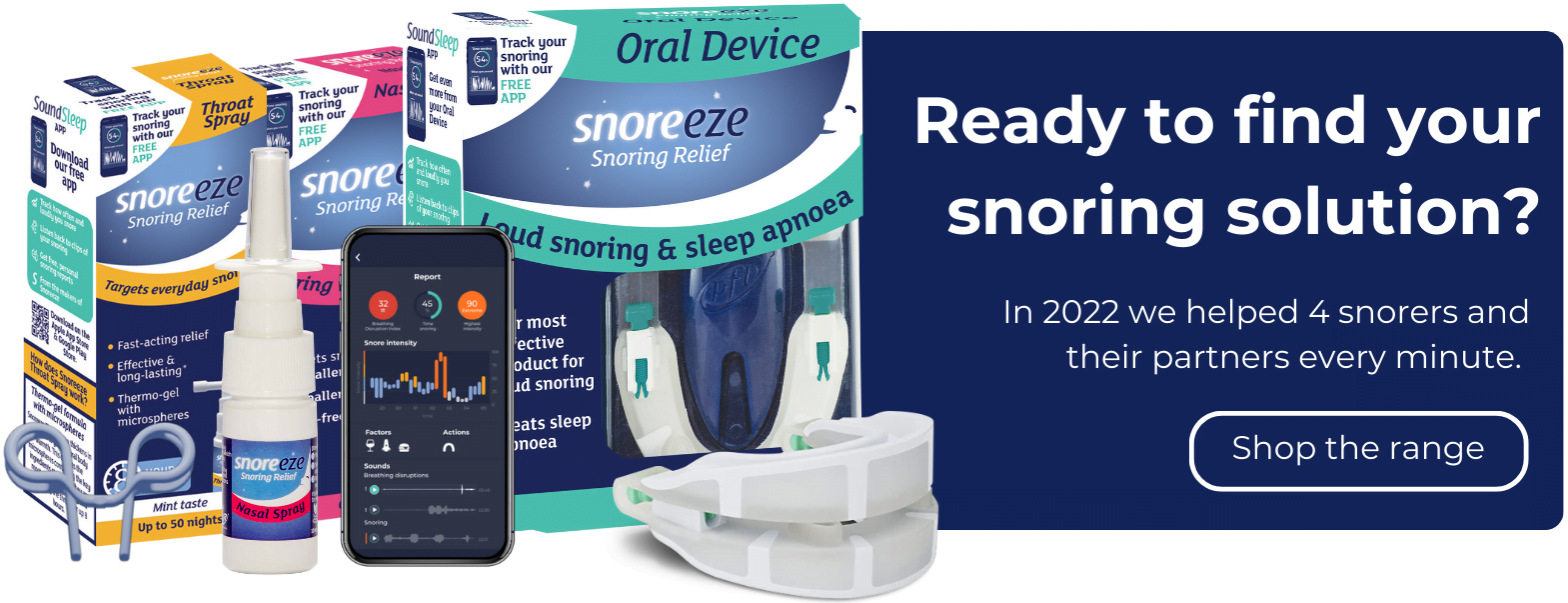Weight gain is just one of the factors than can cause snoring. Unfortunately, it’s often a vicious circle – gaining weight can lead to snoring, and snoring can lead to you piling on the pounds.
Does being overweight make you snore?
You can gain weight in many places all over your body. However, if fat builds in certain areas, it can increase your chances of snoring.
Neck fat directly compresses the upper airway
When you lie down, excess weight around your neck can narrow your airway, causing you to snore.
If you have a larger neck size, then this may also increase your chances of sleep apnoea. For men with a neck size of 17 inches or more, and for women with a neck size of 16 inches or more, this could put you at risk. People with a thicker neck may have a narrower airway, making it more difficult for the air to pass through the throat and to your lungs. The air has to be pulled through the airway, which is what we hear as snoring.
Sometimes the airway becomes so narrow that the walls of the airway stick together and close up. This usually happens for 10-30 seconds but can occur for longer – sometimes up to 50 times an hour or even more. When the airway finally opens up again, you’ll produce a loud, violent snore. This is known as an apnoea. Sometimes the airway may not fully close, but becomes so narrow that you experience an oxygen drop in your blood. This is called a hypopnoea. Frequent apnoeas and hypopneas mean you most likely have OSA.
Midriff fat indirectly compresses the upper airway
Neck fat isn’t the only area that increases the risk of snoring. Fat around the midriff and chest can also be detrimental.
Fat in your belly pushes your diaphragm up, and fat on your chest compresses the ribcage. Both of these decrease the volume of your lungs. This means there is less airflow – air that is needed in order to keep shape in the throat to prevent collapse.
How can snoring make you overweight?
Over-eating and lack of exercise is often the cause of obesity. But did you know that snoring can lead to weight gain?
Snoring and sleep apnoea can cause sleep deprivation; for OSA sufferers, this is down to the body ‘waking itself up’ during the night when struggling to breathe. If you’re tired during the day, it can be tempting to snack on sugary foods to get an energy boost. You may even mistake your tiredness for hunger, and therefore overeat. Sleep-deprived adults tend to have higher ghrelin levels – also known as the hunger hormone. This leaves you feeling more hungry and less full than if you’d managed to get an uninterrupted 7-9 hours of sleep the previous night.
Feeling tired also decreases your desire to exercise – if you’re running on no sleep, you won’t have the energy to exercise.
How to lose weight
The weight loss journey is different for everyone. Factors like genes, hormones and lifestyle can impact how quickly and easily people lose weight. Here are some tips to help you get started.
Maintain a healthy diet
There are many myths surrounding weight loss. Many people think skipping meals is the way to lose weight, but it can actually lead to longer-term weight gain. The key is to make small changes to your diet that you can maintain.
How to have a balanced diet:
- Eat 5 portions of fruit or vegetables every day
- Drink plenty of fluids (at least 6 to 8 glasses a day)
- Base meals on higher fibre starchy foods like potatoes, bread, rice or pasta
- Have some dairy or dairy alternatives (such as soya drinks)
- Eat some beans, pulses, fish, eggs, meat and other protein
- Choose unsaturated oils and spreads, and eat them in small amounts
You can use the free NHS weight loss plan to help guide you along.
Don’t eat right before you sleep
Healthcare professionals recommend that you should stop eating 2-3 hours before bed to allow your body to digest food. When you sleep, your metabolism may slow down by 10-15% in comparison to when you’re awake.
So if you eat a carbohydrate-heavy meal before bed for example, your body may store it as fat rather than energy. Spikes in insulin signal the body to store fat for energy reserves. The worst thing you can eat late at night is anything high in sugar or fat. This has the same effect on insulin levels.
Exercise is key
High intensity activities like running will burn the most calories, but if you want to ease yourself in, why not try yoga or aerobics at home. There’s lots of great videos on YouTube that can guide you – and the best part is that it’s free. Or if you struggle to motivate yourself, joining a gym could encourage you to get up and start moving. Many gyms run a variety of exercise classes.
Get to the root cause of why you eat more
Sometimes we eat more as a response to how we’re feeling, or how our day is going. When you’re stressed, the adrenal glands release a hormone called cortisol. This hormone increases appetite and encourages us to store energy as fat in case of a future need. If you’re not doing regular exercise, this extra fat is going to translate to weight gain.
It’s all about being aware of our emotions – usually easier said than done. When you sense yourself becoming stressed or overwhelmed, stop and think. Am I actually hungry, or am I just trying to make myself feel better? Try meditating or speaking to someone close to share your thoughts.
Deal with your snoring/sleep apnoea
If you know that snoring or OSA is causing you to make bad food choices due to tiredness, take steps to deal with the problem. If lifestyle changes don’t have an impact, you may find a snoring relief product helpful.
What are my snoring relief/OSA treatment options?
Many people don’t realise that there are different types of snoring – and this means that there are different products to suit each type. The Snoreeze range caters for each type of snorer.
Loud snoring and OSA
Sleep apnoea is a serious condition that can affect your quality of sleep and your overall health. It causes your airway to temporarily close, stopping you from being able to breathe.
The first symptom of obstructive sleep apnoea (OSA) is usually snoring. Snoring is caused by a narrowing of the airway, particularly at the back of the throat.
Typical signs of loud snoring / OSA:
- You feel sleepy in the daytime
- You snore very loudly
- Other products haven’t worked
CPAP is often used as a treatment for OSA, but oral devices are another option used to treat mild-to-moderate sleep apnoea. You should always visit your doctor if you suspect you have OSA, as they’ll be able to recommend the best treatment for you. If they advise that an oral device is suitable, try the Snoreeze Oral Device.
Everyday snoring
When you sleep, your airway structure and soft tissues relax. This tissue then dehydrates and vibrates when you breathe, causing snoring.
Typical signs of everyday snoring:
- You sometimes wake with a sore throat
- You tend to sleep on your back
- You snore even when your mouth is closed
If this sound familiar, the Throat Spray, Oral Strips or Lozenges could work well for you.
Snoring with congestion
Cold and allergies like hay fever are a common cause of snoring. When you have a cold (or allergic reaction), your nasal tissue swells causing airflow through the nose to be blocked or restricted. This narrows your airway so the air you breathe travels faster, further dehydrating the tissue. This may force you to breathe through your mouth, leading to a dry mouth and snoring.
Typical signs of snoring with congestion:
- You sleep with your mouth open
- You have a blocked nose/nasal congestion
- You have a diagnosed nasal abnormality
For this type of snoring, try the Nasal Spray, Nasal Dilator or Nasal Strips.
How to track your snoring progress
If you’re on a weight loss journey and want to see if it’s reducing your snoring, we have the perfect solution. Our free app, SoundSleep, tracks how loudly and often you snored. Get daily reports to help monitor your sleep health. Our latest update includes adding a Breathing Disruption Index (BDI) to your snoring reports. This feature tracks how often you stop breathing or struggle to breathe in the night. It’s a good indicator of apnoeas and hypopnoeas.
To download the app from the Apple App Store, click here. To download from the Google Play Store, click here.
We know it can be hard losing weight, but by making small changes each day you could be helping to reduce your chances of snoring.




